Views: 1
Looking at the Research and Possible Links Between Smoking and Acne

The Essential Info
Studies Are Mixed: So far, 12 studies have been performed in an attempt to link smoking cigarettes with acne. Five of these studies show that smoking increases acne, 5 studies show that smoking actually reduces acne, and 2 show no link at all.
Inflammation: We know that smoking increases inflammatory molecules in the body. Since acne is an inflammatory disease, it is safer to avoid cigarettes.
Delayed Wound Healing: Smoking delays wound healing. Medically speaking, acne lesions are small wounds, so again, it is safer to avoid cigarettes for this reason.
Smoking Makes You Look Worse: Smoking is closely linked with wrinkles, premature aging, hair loss, and tooth discoloration. So, even if it doesn’t lead to more acne, there is a good chance it will make you look worse.
Vaping (E-cigarettes): Research is starting to trickle in, and it appears that vaping may also increase inflammatory molecules in the body, so it is also safer to avoid vaping.
My Experience: I smoked for about 5 or 6 years and finally quit graduation day from college. My acne was at its worst during the years that I smoked, but I don’t know whether this was coincidence or not. My advice to anyone would be to just not try cigarettes in the first place. They are incredibly addictive and I found them to be a monkey on my back and a negative influence on my life, regardless of whether they made my acne worse.

The Science
- Smoking Impairs Wound Healing and Worsens Skin Appearance
- Smoking Increases Inflammation
- Vaping (E-cigarettes)
- Smoking May Change Hormone Levels
- Nicotine, the Wild Card
You’ve heard the statistics. Smoking causes three million deaths per year worldwide.1-2 It causes many forms of cancer and untold pain and suffering, not to mention hundreds of billions of dollars in preventable health care costs. Common sense would say that smoking negatively affects almost every bodily condition, including acne. But evidence remains unclear whether this is true.3-14
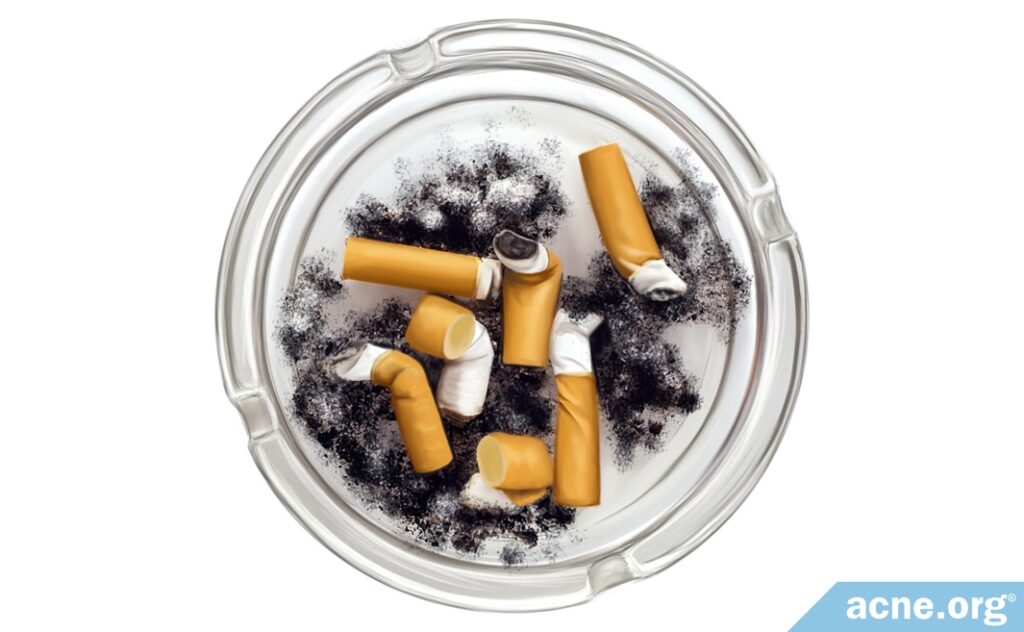
To date, 12 studies have examined the association between smoking and acne. Of these:
- 5 studies reported that smoking actually reduces acne, at least in some populations.4,7-10
- 5 studies concluded that smoking is associated with increased acne.5,11-14
- 2 studies have shown no statistical difference between smokers and non-smokers in regards to acne.3,6
Expand to read details of studies showing that smoking reduces acne

A study published in the Journal of Investigative Dermatology in 2006 in which trained nurses interviewed 27,083 young men over a 20 year period came to a surprising conclusion: “Active smokers showed a significantly lower prevalence of severe acne than nonsmokers.”4

In another study, published in 2007 in the Journal of the European Academy of Dermatology and Venereology, researchers reported that of the 594 participants studied, “In girls, smoking was significantly associated with lower prevalence of acne. No significant associations between acne and smoking variables were detected among boys.”7
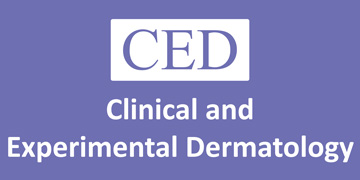
A third study, published in the journal Clinical and Experimental Dermatology in 1993 interviewed 165 patients with acne. “Amongst 96 males, 19.7% were smokers compared to an expected prevalence of 34.5% from national statistics. For 69 females, a prevalence of 12.1% was obtained compared to 32.7% expected. The findings of this study support the hypothesis that some component of cigarette smoke, possibly nicotine, has an anti-inflammatory action on acne.“8

A study published in the Journal of the European Academy of Dermatology and Venereology in 2018 conducted an online survey of 15- to 24-year-olds across seven European countries. A total of 10,521 young people participated in the study. The researchers found that participants who smoked were less likely to suffer from acne. They wrote, “[S]moking tobacco [was] associated with a reduced probability of acne.”9

Finally, a study published in Dermatology in 2015 surveyed 15- to 24-year-olds in France. The researchers found that young people who smoked more than 10 cigarettes a day were significantly less likely to have acne compared to people who smoked less or didn’t smoke at all. The scientists wrote, “We found tobacco to be protective.”10
Expand to read details of studies showing that smoking increases acne

A study published in the British Journal of Dermatology in 2001 examined 896 men and women and showed that smokers tended to have a higher incidence of acne, and the more they smoked, the more severe their acne presented itself.5
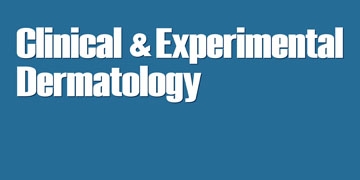
Similar results were reported by a study published in 2004 in Clinical and Experimental Dermatology, which examined 1,264 patients with acne from India and Hong Kong. “When data from both geographical locations were collectively analysed, we again found that significantly more male patients with acne than male controls were smokers. The difference was insignificant for females.”11

A more recent study of 1,046 adult women performed in 2009 showed a “strong correlation” between smoking and non-inflammatory acne.13

Another study to find a correlation between smoking and acne came in 2012 and looked at 17,345 Chinese adolescents and adults. Data pointed toward a significant association with adolescent acne.12

The most recent study to find a correlation between smoking and acne was published in the journal Acta Medica Portuguesa in 2016. The researchers looked at 1,055 people between the ages of 20 and 60 years old who visited a doctor. The scientists found that of the people who smoked, 62.3% had acne, and the more cigarettes they smoked per day, the worse their acne tended to be.14
In short, evidence is conflicting, and the medical research community needs quite a bit more data to come to a consensus.
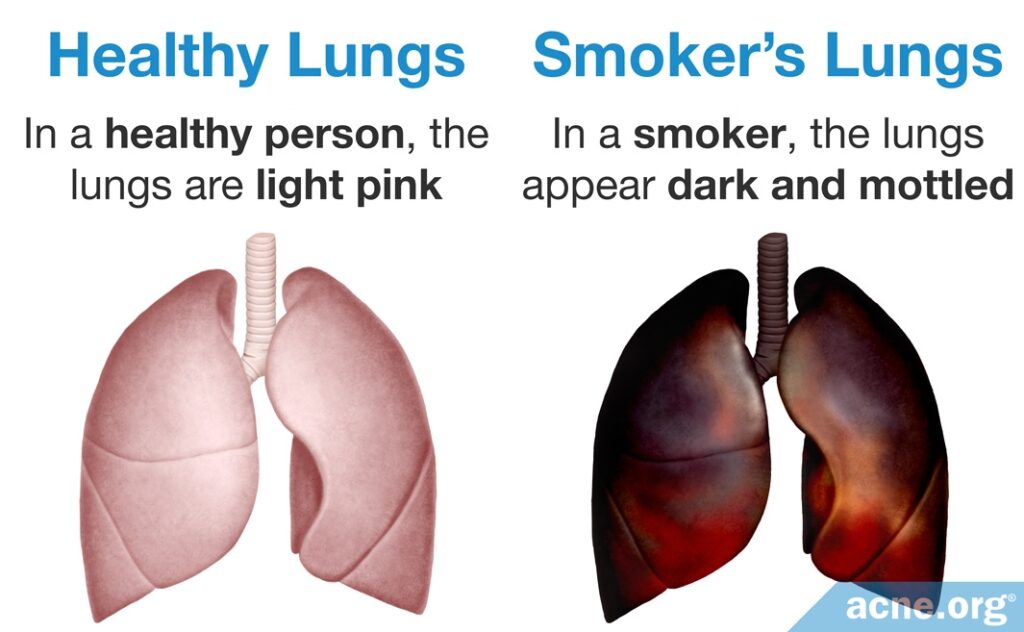
Smoking Impairs Wound Healing and Worsens Skin Appearance
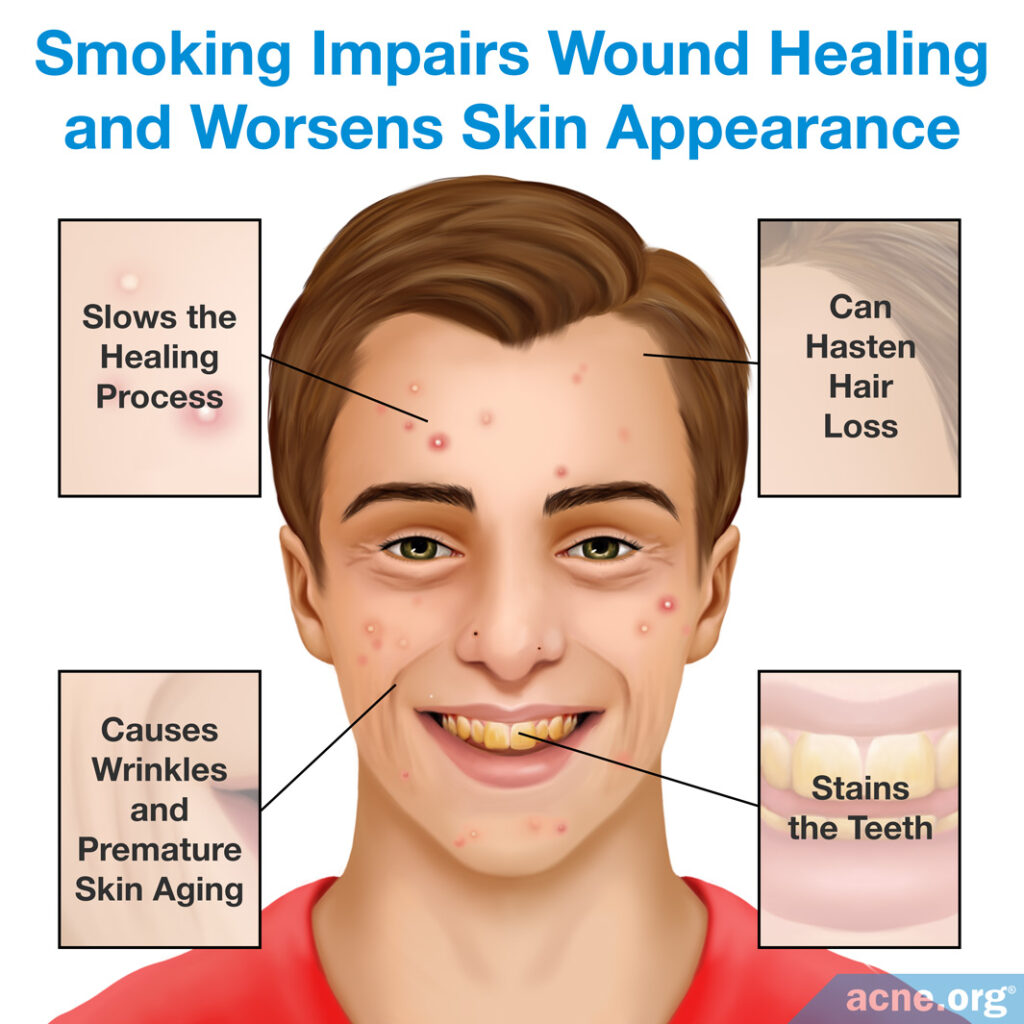
While smoking may or may not aggravate acne, it does harm the skin.15 Among other things, smoking is linked to poor wound healing. Medically speaking, acne lesions are wounds, and thus it would make sense that smoking might cause our bodies to heal acne lesions more slowly. In order for acne lesions to heal, the skin needs to receive sufficient blood supply, and skin cells need to divide in order to make new cells to repair the wound. Smoking reduces these functions and considerably slows down the healing process.1,2
Smoking is also closely associated with wrinkles and premature skin aging. Quitting smoking, or not taking up smoking in the first place, is one of the best preventative measures against premature aging. Smoking also stains the teeth and can hasten hair loss.1,2 Not surprisingly, in surveys of body esteem, smokers tend to rank lower than non-smokers.16
Smoking Increases Inflammation
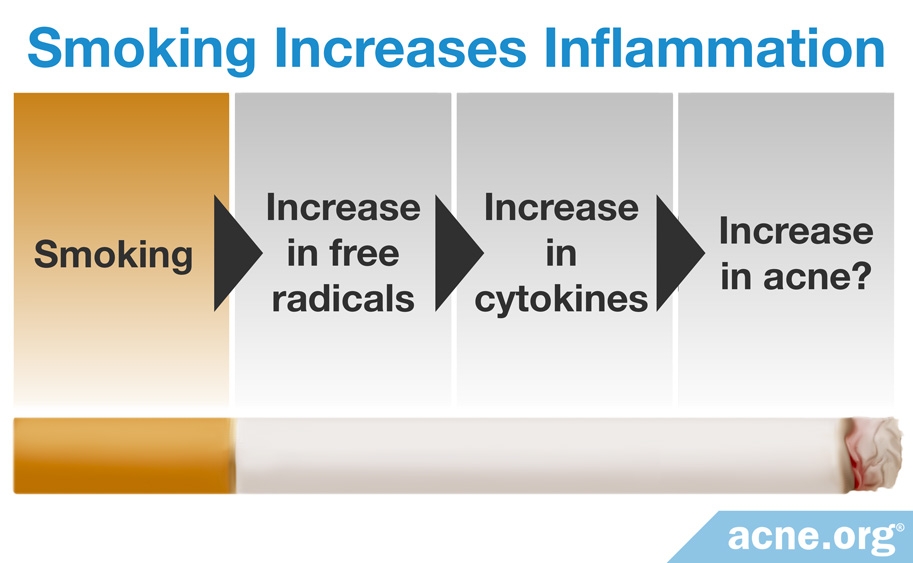
Harmful effects of smoking are largely due to the fact that smoking results in the production of compounds called free radicals, which cause the body to produce inflammatory molecules called cytokines.17 These molecules play a role in the early stages of acne formation. Studies have shown that cytokine levels are high in clogged pores and when healthy skin is exposed to high levels of cytokines, it starts to develop acne.18 In fact, one recent study compared the amount of cytokines in clogged pores in smokers with acne versus non-smokers with acne. The researchers found that the smokers with acne had more of these inflammatory molecules in their clogged pores, strengthening the idea that smoking may contribute to acne through increased inflammation.19
Vaping (E-cigarettes)
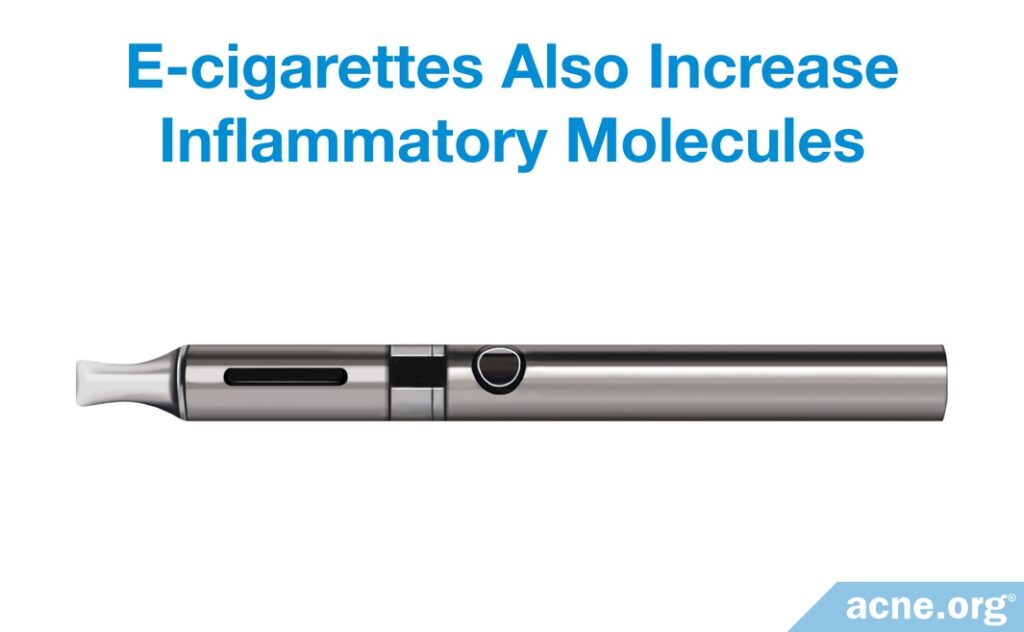

A 2008 What about vaping (e-cigarettes)? A study published in 2016 in the journal Chest showed that tobacco and electronic cigarettes both increase the levels of inflammatory molecules (sNOX2-dp and 8-isoPGF2a) and decrease the levels of anti-inflammatory molecules (vitamin E and nitric oxide) in the blood. “After having smoked either a [tobacco cigarette] or an E-cigarette, significant changes in the levels of sNox2-dp, 8-isoPGF2α, Vitamin E and NO bioavailability [were found].”17
Smoking May Change Hormone Levels
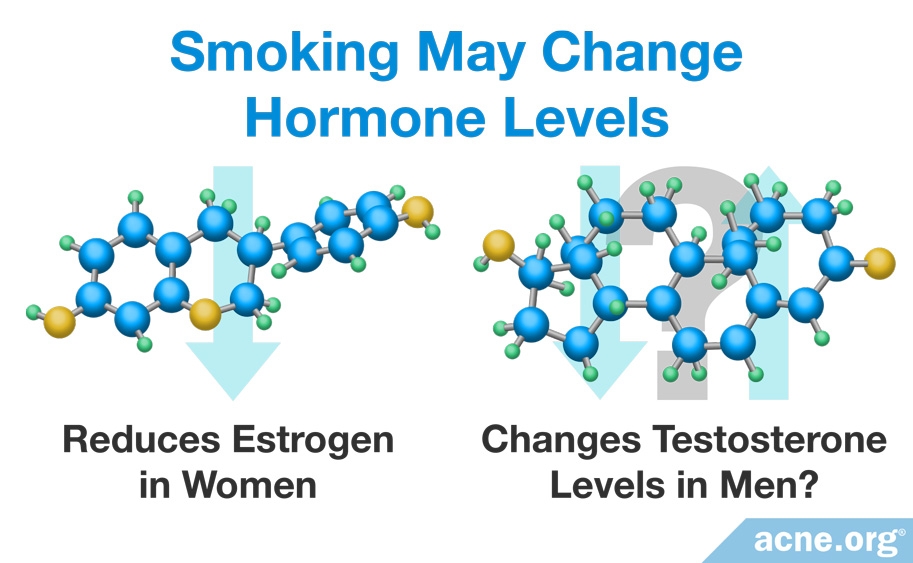
One of the ways that smoking may influence acne is by changing hormone levels. Hormones, particularly higher than normal levels of testosterone in both men and women, and imbalances of the female hormones estrogen and progesterone in women, are known to worsen acne. Studies have shown that smoking reduces levels of estrogen in women and can impair the function of the ovaries, the organs that produce estrogen. Smoking can also cause menstrual cycles to become irregular.

The link between smoking and testosterone is not as clear, with studies reporting conflicting data. Testosterone is present in both males and females, and is intricately linked with acne. Higher testosterone levels usually mean more incidence and severity of acne. We only have research on testosterone levels in male smokers at this time. Research has reported that bioavailable testosterone, or the testosterone available to the body’s tissues, may increase, decrease, or remain the same in male smokers. A review in the European Journal of Endocrinology concluded, “Significantly increased, decreased and unchanged levels of total testosterone in male smokers have been reported in various studies.”20
Nicotine, the Wild Card
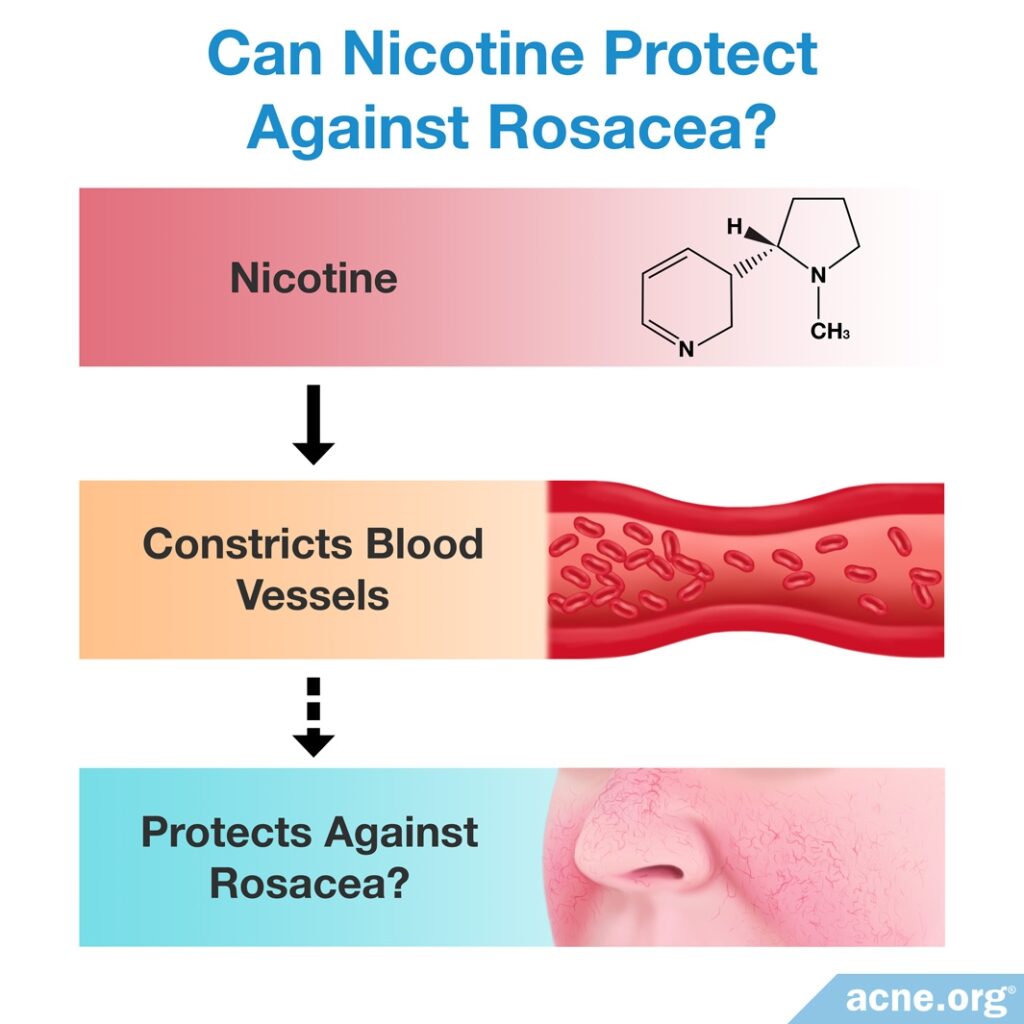
As with many things in life, there are exceptions to the rule. For instance, evidence is showing that smoking may actually help protect against mouth sores and rosacea. The potential positive effects of smoking are most likely from nicotine, and not from smoking itself. Nicotine by itself is not necessarily harmful. In the case of acne, the constriction of blood vessels that nicotine produces may inhibit the production of more severe forms of acne in a lucky few people.21 How and if this happens is still up for debate.
References
- Freiman, A., Bird, G., Metelitsa, A. I., Barankin, B. & Lauzon, G. J. Cutaneous effects of smoking. J. Cutan. Med. Surg. 8, 415 – 423 (2004). https://www.ncbi.nlm.nih.gov/pubmed/15988548
- Morita, A. Tobacco smoke causes premature skin aging. J. Dermatol. Sci. 48, 169 – 175 (2007). https://www.ncbi.nlm.nih.gov/pubmed/17951030
- Firooz, A., Sarhangnejad, R., Davoudi, S. M. & Nassiri-Kashani, M. Acne and smoking: is there a relationship? BMC Dermatol. 5, 2 (2005). https://www.ncbi.nlm.nih.gov/pubmed/15790395
- Klaz, I., Kochba, I., Shohat, T., Zarka, S. & Brenner, S. Severe acne vulgaris and tobacco smoking in young men. J. Invest. Dermatol. 126, 1749 – 1752 (2006). https://www.ncbi.nlm.nih.gov/pubmed/16645586
- Schafer, T., Nienhaus, A., Vieluf, D., Berger, J. & Ring, J. Epidemiology of acne in the general population: the risk of smoking. Br. J. Dermatol. 145, 100 – 104 (2001). https://www.ncbi.nlm.nih.gov/pubmed/11453915
- Jemec, G. B.et al. Have oral contraceptives reduced the prevalence of acne? a population-based study of acne vulgaris, tobacco smoking and oral contraceptives. Dermatology 204, 179 – 184 (2002). https://onlinelibrary.wiley.com/doi/abs/10.1111/jdv.12966
- Rombouts, S., Nijsten, T. & Lambert, J. Cigarette smoking and acne in adolescents: results from a cross-sectional study. J. Eur. Acad. Dermatol. Venereol. 21, 326 – 333 (2007). https://onlinelibrary.wiley.com/doi/abs/10.1111/jdv.12160
- Mills, C. M., Peters, T. J. & Finlay, A. Y. Does smoking influence acne? Clin. Exp. Dermatol. 18, 100 – 101 (1993). https://www.ncbi.nlm.nih.gov/pubmed/8481981
- Wolkenstein, P., Machovcová, A., Szepietowski, J. C., Tennstedt, D., Veraldi, S. & Delarue, A. Acne prevalence and associations with lifestyle: a cross-sectional online survey of adolescents/young adults in 7 European countries. J. Eur. Acad. Dermatol. Venereol. 32, 298-306 (2018). https://pubmed.ncbi.nlm.nih.gov/28707712/
- Wolkenstein, P., Misery, L., Amici, J. M. et al. Smoking and dietary factors associated with moderate-to-severe acne in French adolescents and young adults: results of a survey using a representative sample. Dermatol. 230, 34-39 (2015). https://pubmed.ncbi.nlm.nih.gov/25413494/
- Chuh, A. A., Zawar, V., Wong, W. C. & Lee, A. The association of smoking and acne in men in Hong Kong and in India: a retrospective case-control study in primary care settings. Clin. Exp. Dermatol. 29, 597 – 599 (2004). https://www.ncbi.nlm.nih.gov/pubmed/15550130
- Shen, Y. et al. Prevalence of acne vulgaris in Chinese adolescents and adults: a community-based study of 17,345 subjects in six cities. Acta Derm. Venereol. 92, 40 – 44 (2012). https://pdfs.semanticscholar.org/c638/70a8e25bd12b097dac2791015f013b5cbcca.pdf
- Capitanio, B. et al. Acne and smoking. Dermatoendocrinol. 1, 129 – 135 (2009). https://www.ncbi.nlm.nih.gov/pmc/articles/PMC2835905/
- Semedo, D., Ladeiro, F., Ruivo, M., D’Oliveira, C., De Sousa, F., Gayo, M., Lima, C., Magalhães, F., Brandão, R., Branco, M., Da Silva, I., Batista, J., Amado, J., Massa, A. & Neves-Amado, J. Adult acne: Prevalence and portrayal in primary healthcare patients, in the Greater Porto Area, Portugal. Acta Med. Port. 29, 507-513 (2016). https://pubmed.ncbi.nlm.nih.gov/28060687/
- Just-Sarobe, M. [Smoking and the skin]. Actas Dermosifiliogr. 99, 173 – 184 (2008). https://journals.plos.org/plosmedicine/article?id=10.1371/journal.pmed.1001611
- Kornblau, I. S., Pearson, H. C. & Breitkopf, C. R. Demographic, behavioral, and physical correlates of body esteem among low-income female adolescents. J. Adolesc. Health 41, 566 – 570 (2007). https://psycnet.apa.org/record/2007-18286-009
- Carnevale, R. et al. Acute impact of tobacco vs electronic cigarette smoking on oxidative stress and vascular function. Chest 150, 606 – 612 (2016). https://www.ncbi.nlm.nih.gov/pubmed/27108682
- Szabo, K. et al. Interleukin-1A +4845(G> T) polymorphism is a factor predisposing to acne vulgaris. Tissue Antigens 76, 411 – 415 (2010). https://www.ncbi.nlm.nih.gov/pubmed/20630038
- Yang, Y. S., Lim, H. K., Hong, K. K., Shin, M. K., Lee, J. W., Lee, S. W. & Kim, N. I. Cigarette smoke-induced interleukin-1 alpha may be involved in the pathogenesis of adult acne. Ann. Dermatol. 26, 11-16 (2014). https://pubmed.ncbi.nlm.nih.gov/24648681/
- Kapoor, D. & Jones, T. H. Smoking and hormones in health and endocrine disorders. Eur. J. Endocrinol. 152, 491 – 499 (2005). https://www.ncbi.nlm.nih.gov/pubmed/15817903
- Metelitsa, A. I. & Lauzon, G. J. Tobacco and the skin. Clin. Dermatol. 28, 384 – 390 (2010). https://www.ncbi.nlm.nih.gov/pubmed/20620754
The post Does Smoking Cigarettes Cause Acne? appeared first on Acne.org.

